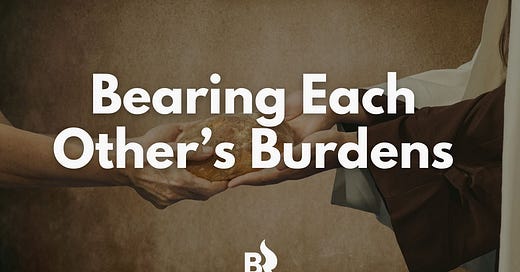“Bear one another's burdens, and in this way you will fulfill the law of Christ.”
— Galatians 6:2
Over the past month, I have had the honor of traveling to over eighteen different cities around the country on a tour for my new book. While this tour has been incredibly tiring, it has also been deeply encouraging.
I’ve been encouraged to see communities in every corner of the country gathering together to support one another and to resist the injustices that continue to unfold week after week.
From Birmingham, Alabama, to Hattiesburg, Mississippi, to San Francisco, California, people are coming together in communities of faith—across diverse backgrounds—and leaning on and collaborating with one another to do the good work of justice in their communities.
These aren’t the stories you typically hear on the news—but this is the reality happening across our nation.
At the same time, another common thread in virtually every conversation I’ve had is that people are anxious and tired.
They’re looking at the headlines and are worried—really worried—about the future of our country and world.
They’re worried about their families.
They’re worried about traveling outside of the country.
They’re worried about their stability.
They’re worried about violence.
People are worried.
And it makes sense. The world can feel like a frightening place.
But what I’ve also seen is this: the one thing that makes a real difference for those struggling with fear about the future is the community they build.
The local church remains one of the best institutions in our society for people to come together, reflect on the big questions, plan ways to serve, resist oppression, and support one another through life’s daily challenges.
In our increasingly isolated and disconnected society—where so many of us spend our days in front of screens, bombarded by bad news—it’s easy to feel overwhelmed.
But when we come together with others and share our lives, our worries, and our different perspectives, the burdens we carry become lighter.
We may even discover new ways of seeing the world—new opportunities to make a practical difference in our neighborhoods.
In this morning’s Scripture reading, the Apostle Paul urges the Christians in Galatia to bear one another’s burdens—or literally, in Greek, to “carry each other’s weight”—which he says fulfills the law of Christ.
In other words, the core requirement of Christian faith—the thing God most desires for us—is that we carry one another’s load.
Support one another.
Show up for one another.
Love one another.
This is the entire way of Jesus: to look at the community around us and ask, How can I be of service?
One of the best ways to deal with the angst of this moment is through service.
So often, we focus on the impact the world’s turmoil might have on us and our families—and that’s natural.
But anxiety turned inward grows and immobilizes us.
Anxiety is, in essence, energy stored in our bodies—priming us for fight or flight.
What if, instead of letting that energy build and churn within us, we chose to use it for good?
What if, each day, we made it a point to carry someone else’s burden—to shift our attention from ourselves and become a channel of blessing for others?
The way of Jesus is both incredibly simple and incredibly hard.
Simple, because we all know deep down that it’s right.
Hard, because it requires us to shift our focus from self to others.
It’s hard to stop the spiral of our own thoughts and, instead, pay attention to those who need us most.
But I promise: if you begin to make it a regular discipline to love, serve, and help others—not only will you feel better, but you’ll begin to make the world better.
Remember: Jesus didn’t come with the armies of heaven to wipe away evil in one grand sweep.
That’s not how he built the Kingdom of God.
He did it one person at a time.
One subversive act of love at a time.
Kneeling beside someone in poverty and meeting their need.
Sitting with the sick and offering healing.
Most of Jesus’ miracles weren’t for the masses—they were quiet, personal acts of service.
And when he sent his disciples into the world, he told them to do the same.
He tells us to do the same.
Of course, we all wish God would swoop down and make everything right, here and now.
But our faith tells us that God works through us—through individuals—transforming lives and the world one step at a time.
We are called to bear one another’s burdens—placing the needs of others above our own—and trusting that as we sow charity, justice, and love into the world, we will also reap them in our own lives.
May we allow the Spirit to speak to our hearts and remind us of the words of our Savior:
“Love one another.”
Stand with one another.
Bear one another’s burdens.
Show up for one another in the midst of hardship.
In the words of Mother Teresa:
“Do not wait for leaders; do it alone, person to person.”
In this way, we not only fulfill the law of Christ, but we become channels through which God can bring meaningful change to the world.
May it be so.
Amen.






Love your message, Brandan. For me, you've summarized Christian identity. It's not a "thing" or an "essence," or a "condition." It's an action, a way of living.
Yes, build up one another. It is too easy and too prevalent to deminish.